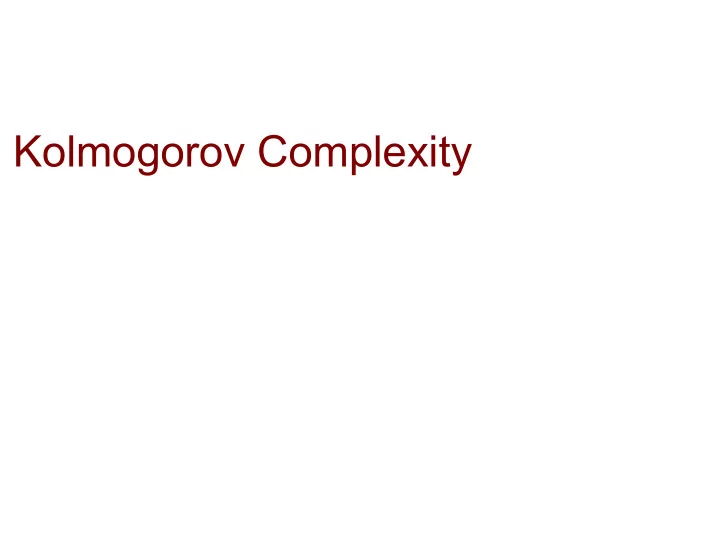

Kolmogorov Complexity
Suppose I say I tossed a coin 40 times and got: 1010101010101010101010101010101010101010 What do you say?
Suppose I say I tossed a coin 40 times and got: 1010101010101010101010101010101010101010 You don't believe me Suppose I say I tossed a coin 40 times and got: 11101010101001010100111001010010111100010 What do you say?
Suppose I say I tossed a coin 40 times and got: 1010101010101010101010101010101010101010 You don't believe me Suppose I say I tossed a coin 40 times and got: 11101010101001010100111001010010111100010 Maybe Why? What is the probability of the two strings?
Suppose I say I tossed a coin 40 times and got: Pr[1010101010101010101010101010101010101010 ] = 2 -40 You don't believe me Suppose I say I tossed a coin 40 times and got: Pr[11101010101001010100111001010010111100010 ] = 2 -40 Maybe Why? The two strings have the same probability!
Classical probability theory does not capture intuitive notion of “random” Observation: 1010101010101010101010101010101010101010 can be programmed as
Classical probability theory does not capture intuitive notion of “random” Observation: 1010101010101010101010101010101010101010 can be programmed as “Repeat `10' 20 times” Program length much shorter than string. String is compressible This seems impossible for 11101010101001010100111001010010111100010
We are going to make a formal definition. We need to calculate program lengths somewhat precisely How do you represent a pair (x,y), where x,y {0,1}* ? ∈ Can't just concatenate bits: ?
We are going to make a formal definition. We need to calculate program lengths somewhat precisely How do you represent a pair (x,y), where x,y {0,1}* ? ∈ Can't just concatenate bits: you wouldn't know when x ends. One solution: ?
We are going to make a formal definition. We need to calculate program lengths somewhat precisely How do you represent a pair (x,y), where x,y {0,1}* ? ∈ Can't just concatenate bits: you wouldn't know when x ends. One solution: write each bit of x twice, use “01” as delimiter |(x,y)| = ?
We are going to make a formal definition. We need to calculate program lengths somewhat precisely How do you represent a pair (x,y), where x,y {0,1}* ? ∈ Can't just concatenate bits: you wouldn't know when x ends. One solution: write each bit of x twice, use “01” as delimiter |(x,y)| = 2|x| + |y| + 2 Better: ?
We are going to make a formal definition. We need to calculate program lengths somewhat precisely How do you represent a pair (x,y), where x,y {0,1}* ? ∈ Can't just concatenate bits: you wouldn't know when x ends. One solution: write each bit of x twice, use “01” as delimiter |(x,y)| = 2|x| + |y| + 2 Better: write the length of x in binary, then x, then y |(x,y)| = ?
We are going to make a formal definition. We need to calculate program lengths somewhat precisely How do you represent a pair (x,y), where x,y {0,1}* ? ∈ Can't just concatenate bits: you wouldn't know when x ends. One solution: write each bit of x twice, use “01” as delimiter |(x,y)| = 2|x| + |y| + 2 Better: write the length of x in binary, then x, then y |(x,y)| = 2 floor(log |x| + 1) + |x| + |y| + 2 ≤ 2log |x| + |x| + |y| + 4 Exercise: do better
Definition: The Kolmogorov complexity of x, denoted K(x), is the minimum length of a pair (M,y) such that TM M on input y outputs x. Fact: c : x : K(x) ≤ |x| + c ∃ ∀ Proof:
Definition: The Kolmogorov complexity of x, denoted K(x), is the minimum length of a pair (M,y) such that TM M on input y outputs x. Fact: c : x : K(x) ≤ |x| + c ∃ ∀ Proof: Define M := “On input y, output y.” |(M,x)| ≤ |M| + |x| Fact: c : x : K(xx) ≤ K(x) + c ≤ |x| + c ∃ ∀ Proof:
Definition: The Kolmogorov complexity of x, denoted K(x), is the minimum length of a pair (M,y) such that TM M on input y outputs x. Fact: c : x : K(x) ≤ |x| + c ∃ ∀ Proof: Define M := “On input y, output y.” |(M,x)| ≤ |M| + |x| Fact: c : x : K(xx) ≤ K(x) + c ≤ |x| + c ∃ ∀ Proof: Let (M,y) be a shortest pair such that M(y) = x. Consider M' that on input (M,y) runs M(y) to get x, and then makes two copies of x. So M'((M,y)) = xx, and |(M',(M,y))| ≤ 2|M'| + |(M,y)| ≤ K(x) + c. 2 + 17) ≤ K(x) + c Exercise: c x : K( x ∃ ∀
Fact: c : x,y : K(xy) ≤ 2 log(K(x)) + K(x) + K(y) + c ∃ ∀ Proof: Let M x (x') = x where |(M x , x')| = K(x) M y (y') = y where |(M y , y')| = K(y) Consider M that first runs M x (x') then M y (y') | (M, ( (M x , x') , (M y , y') ) ) | = = 2 |M| + | ( (M x , x') , (M y , y') ) | = 2 |M| + 2 log(K(x)) + K(x) + K(y), using pairing (.,.) that we discussed Exercise: c x,y : K(xy) ≥ K(x) + K(y) + c ∀ ∃
Definition: A string x is incompressible if K(x) ≥ |x|. Fact: ∀ n there are incompressible strings of length n. Proof:
Definition: A string x is incompressible if K(x) ≥ |x|. Fact: ∀ n there are incompressible strings of length n. Proof: JUST COUNT The number of descriptions (M,x) of length < n is at most 2 0 + 2 1 + 2 2 + … + 2 n-1 < 2 n = number of length-n strings Exercise: ● The set of incompressible strings is undecidable Exercise: ● K(x) is not computable
Recommend
More recommend